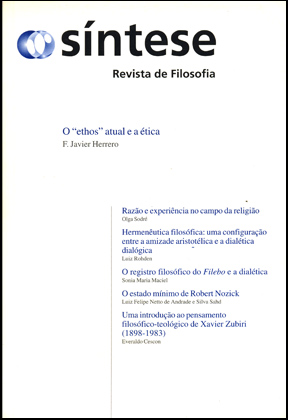UMA INTRODUÇÃO AO PENSAMENTO FILOSÓFICO-TEOLÓGICO DE XAVIER ZUBIRI (1898-1983)
DOI:
https://doi.org/10.20911/21769389v31n100p239-282/2004Palavras-chave:
Xavier Zubiri, Filosofia da inteligência, Filosofia da realidade, Filosofia da religião.Resumo
Este artigo pretende ser uma introdução ao pensamento filosófico-teológico de Xavier Zubiri por meio de uma leitura histórico-analítica e hermenêutico-sintética de suas principais obras, prestando atenção à “espiralidade” de seu pensamento. Procura-se conjugar e articular os momentos analítico e sintético, por meio de uma contextualização histórica e evolutiva dos textos e um balanço das idéias e silêncios,em confronto com o todo da obra zubiriana, os estudos de alguns intérpretes e outros textos paralelos, respectivamente. A gênese do uma filosofia radicalmente nova, que parte do que pode entender-se como uma crítica radical de toda a filosofia anterior – que caiu numa “logificação da inteligência” e numa “entificação da realidade” – e que o leva a abordar todos os problemas em outro plano para terminar numa visão nova da realidade. Pode-se distinguir, no itinerário filosófico zubiriano, três etapas intelectuais: fenomenológica, ontológica e metafísica. Três também são os grandes blocos temáticos do corpus zubirianum: filosofia da inteligência, a realidade, problema de Deus. Além disso, também realizou estudos antropológicos, cosmológicos e da história da filosofia. Sua peculiaridade filosófica reside em, partindo da fenomenologia de Husserl e mantendo-se fiel aos problemas que enfrentou, levar adiante um rigoroso processo de “radicalização” crescente. De fato, desligada da tutela da ciência, a filosofia do nosso tempo está convencida de que sua missão, mais do que “progredir” para novos conhecimentos, consiste em “retroceder” a seus fundamentos, a suas raízes.
Abstract: The paper aims to be an introduction to Xavier Zubiri's philosophicaltheological thought, through a historical-analytical and hermeneutical-synthetic reading of his main works, bearing in mind the “spiraling” feature of his thought. It tries to conjugate and articulate the analytical and synthetic moments, through a historical and evolutive contextualization of his texts and a balance of his ideas and silences, in confrontation with his whole work, the studies of some interpreters and other parallel texts. The genesis of a radically new philosophy, that starts from what can be interpreted as a radical criticism of the whole previous philosophy –resulted in a “logificación de la inteligencia” and “entificación de la realidad” and led him to approach all problems at another level in order to achieve a new vision of reality. Three intellectual stages can be distinguished in the philosophical itinerary of Xavier Zubiri: a phenomenological, ontological and metaphysical stage. There also are three broad themes in Zubiri's corpus: the intelligence, the reality and the problem of God. Besides this, the philosopher carried out anthropological and cosmological studies as well as studies on the history of philosophy. His own philosophy, emanating from Husserl's phenomenology and faithful to the problems he was confronted with, consists in carrying forward a strict process of growing “radicalization”. In fact, disconnected from the science guardianship, present-day philosophy realizes that its mission consists in going back to its foundations, its “roots” rather than in progressing towards new knowledge.






























